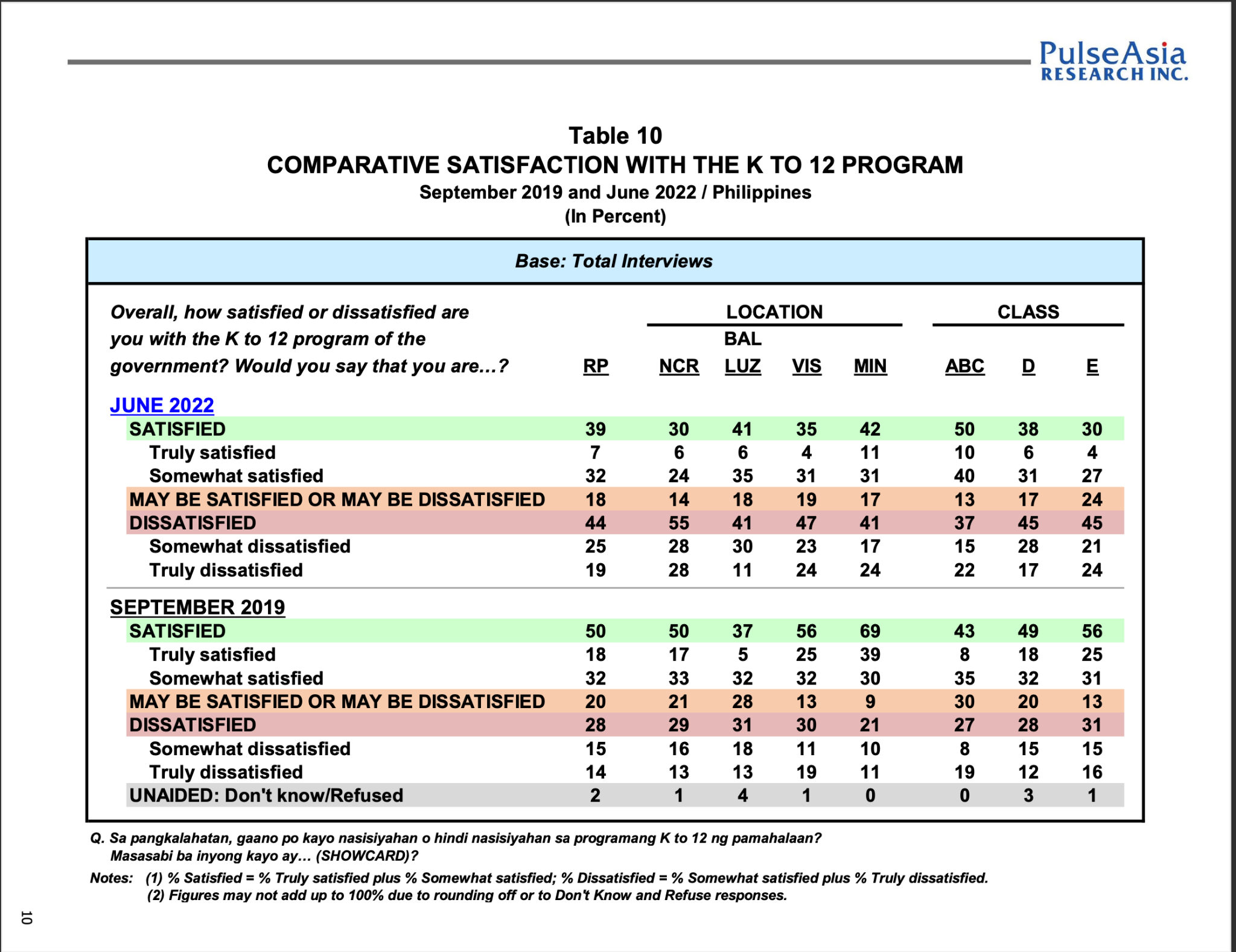44% of adult Pinoys 'dissatisfied' with K-12 program — survey

A growing number of Filipino adults have expressed dissatisfaction with the country's K-12 basic education system, a Pulse Asia survey commissioned by Senator Sherwin Gatchalian showed.
The survey, conducted on June 24 to 27, indicated that 44% of the respondents were not satisfied with the program, while 39% were satisfied, and 18% undecided.
A total of 1,200 Filipino adults nationwide responded to the survey which has a margin of error of ± 2.8.
The dissatisfaction rate was 16 percentage points higher compared to the survey result in September 2019, which showed that 28% of the respondents were not satisfied with the government's K-12 program.
Gatchalian, who is set to retain his chairmanship of the Senate basic education committee, said the "growing" dissatisfaction with the K-12 system has highlighted the urgency of conducting review and reforms on the program.
“Malinaw sa boses ng ating mga kababayan na hindi sila kuntento sa programa ng K-12. Ito ay dahil hindi natutupad ang mga pangako nito at naging dagdag na pasanin lamang ito sa ating mga magulang at mga mag-aaral,” he said in a news release.
(It is clear that the people are not satisfied with the K-12 program. It's because the promises are not fulfilled and it only adds burden to parents and teachers.)
The senator earlier said one of the unfulfilled promises is the employment after graduation.
He emphasized that the creation of the Second Congressional Commission on Education (EDCOM II) is in line with the K-12 review. Its focus is to "look at the quality of education and performance of learners."
President Ferdinand "Bongbong" Marcos Jr. already ordered for a review on the implementation of the K-12 program.
Senator Robinhood Padilla said he is in favor of continuing the implementation of the K-12 program, but stressed that a reform on the curriculum is needed.
Padilla said that teaching the subjects of Philippine History and Home Economics should be prioritized.
“Kasi ang K-12 natin ang unang tinamaan, tinanggal ang Philippine History, pinalitan ng Asian History at World History. Ang akin naman magsentro tayo sa Philippine History kasi ang Philippine History dito imposibleng hindi mapag-usapan ang Asian at World History,” he told reporters Monday.
(Under the K to 12 curriculum, Philippine History was removed and was replaced by Asian History and World History. For me, let's focus on Philippine History because if there’s Philippine History it would be impossible not to talk about Asian and World History.)
“Ang gusto ko lang magsentro sa atin. Kasi kapag hindi natin sinanay ang ating kabataan na alam nila saan ang ugat nila, parang puno 'yan, kahit mahinang hangin babagsak 'yan. Kailangan alam ng bawat Pilipinong kabataan kung sino sila. Paano natin sasabihing dapat taas noo dahil Pilipino ka?” he added.
(I just want the curriculum to focus on us Filipinos. Because if we don't train our youth about their roots, like a tree, they will fall even with a weak wind. Every Filipino youth needs to know who they are. How can we tell them to hold their heads up high because they are Filipinos?)
Gatchalian earlier said that national history should be strengthened in the curriculum, but they would first need to study if it should be a separate subject.
“Sang-ayon ako na palakasin ang history at dapat talagang dumiin ito sa isip at puso ng mga kabataan pero dapat pang pag-aralan kung dapat nga ba itong gawing separate subject,” he said.
(I agree that history should be strengthened in the curriculum and it should leave an impression on the youth. But we still have to study whether to make it a separate subject.)
Meanwhile, Padilla underscored the importance of the Home Economics subject for students to learn how to do business at an early age.
“Pati Home Economics kasi nawala na ito. Ito ang mga batay na dapat ibalik. Nong elementary kami tinuturuan kami magsaing, magluto… tinuturuan kami mag-bake. Ngayon ang bata sabihan mo magsaing, ano yan? Kaya na ni nanay 'yan,” he stressed.
(Even Home Economics has been removed. These are the basics that must be reinstated. In elementary school we were taught to cook rice, dishes… we were taught to bake. Now you tell the child to cook rice, they would say what is that? Mom can do that.)
“Tapos halimbawa noong pumunta kami sa China dati sinama kami ni (dating) Pangulong Duterte, ang bata doon tinuturuan nang magnegosyo… Masyado tayong nahihibang sa computer. Tutal pinag-aaralan ang computer, turuan sila magnegosyo,” he further said.
(For example, when we went to China with (former) President Duterte, the children there were taught how to do business… We are very passionate about computers. If we can learn about computers, teach the child to do business.)—Mel Matthew Doctor/AOL, GMA News




